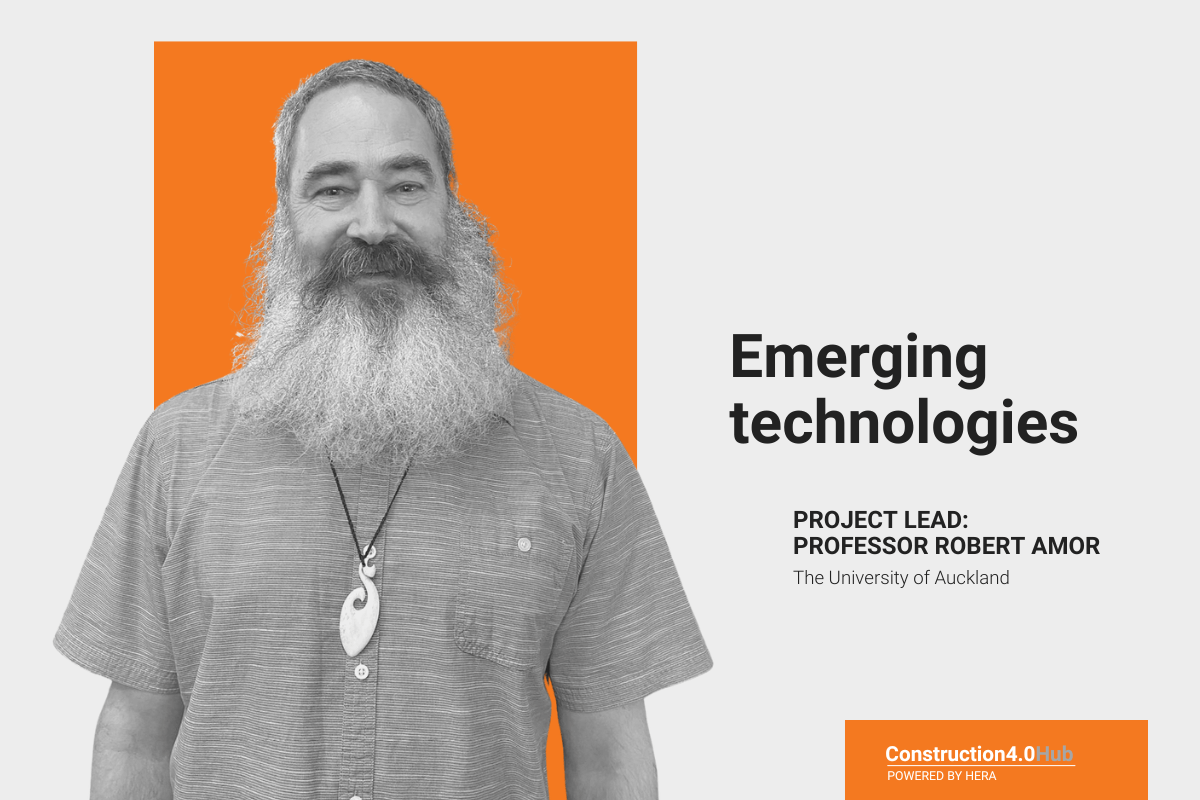Our last research theme is intended to ensure we remain on top of emerging technologies.
The Construction 4.0 technologies theme will be research driven to investigate emerging artificial intelligence approaches (typically developed for domains outside of construction) applicable to our research programmes and adapt emerging computing techniques to the complex requirements of Construction 4.0 data.
This theme is led by Professor Robert Amor from The University of Auckland. Robert is an expert in interoperability and integrated environments. Since 2003, he has coordinated CIB’s working group W78 (IT for Construction).
He is also theme leader for digital innovation in the MBIE-funded Building Innovation Partnership.
Computing technologies for Construction 4.0
Our research programmes are reliant on considerable analyses of data and flows of data. While BIM supports interoperability between processes and provides a digital twin of the physical entity, it still requires advanced analytical models to deliver the benefits envisaged in our research programmes. To engender transformation, these methods must be refined through research on construction datasets to ensure their applicability (e.g. to comprehend NZ codes and standards). Thus, this research will deliver technologies directly applicable to Construction 4.0 projects for the Aotearoa New Zealand construction sector.
These techniques will be central to the productivity and efficiency gains that are proposed by the three research programmes (circular design, smart construction and monitoring 4.0). The developed techniques will be able to be utilised on projects across Aotearoa New Zealand’s industry following their optimisation and demonstration within this project.
This research will investigate and develop the underlying technologies that support the Construction 4.0 research programmes in the project. The starting point will be AI (Artificial Intelligence) and interoperability techniques currently being deployed for other industries. Informed by the requirements for the circular design, smart construction and monitoring 4.0 research programs, a selection of evolving techniques will be selected and further developed to match the needs of the project. This will ensure that optimal techniques are to be available for each of the research programmes and then for commercial projects within the construction sector.
Identification of candidate Construction 4.0 technologies
This will involve specifying and refining the requirements of Construction 4.0 technologies for the three research programmes. It also involves identification of candidate technologies and investigating the gap between their current state and the needs of the research programs.
Computational technologies refined
This will involve researching, developing and refining Construction 4.0 technologies to provide an optimal solution for circular design, smart construction and Monitoring 4.0.
It will also involve the testing of the optimality of the technologies and their adaption and refinement for the exact research programme outputs.
Verification via case studies
Documenting the process of refinement of computing techniques for Construction 4.0 requirements in a core part of this research. This provides the foundation for further adoption of technologies not currently used in the construction industry.
Case studies will be developed for technology fit to circular design, smart construction and Monitoring 4.0 projects and the benefits of these developed technologies.
Core under-pinning research
The approach here is based on software development methodologies which allow the understanding of requirements for projects, and refinement of those requirements into specifications for optimal software.
The individual needs of the research programs will drive the initial investigation of AI and interoperability methods and determine the criteria against which successful techniques will be determined.
Generic AI and interoperability approaches will be surveyed in relation to the research requirements of our research programs and themes. Candidate techniques will be short-listed and trialled by adapting to the needs of the individual research programmes. Using the success criteria of the research projects, the techniques will be modified and refined to perform successfully for the Construction 4.0 domain.
In most cases it is likely that we will need to gather sufficient data to have a labelled training set sufficient for particular techniques as well as a validation data set. These needs of potential AI techniques will be discussed with all research project and theme leaders to ensure a successful match to available data.
As always – we are here to answer any questions that you have, so please feel to reach out to any of the named researchers or myself at troy.coyle@hera.org.nz.


